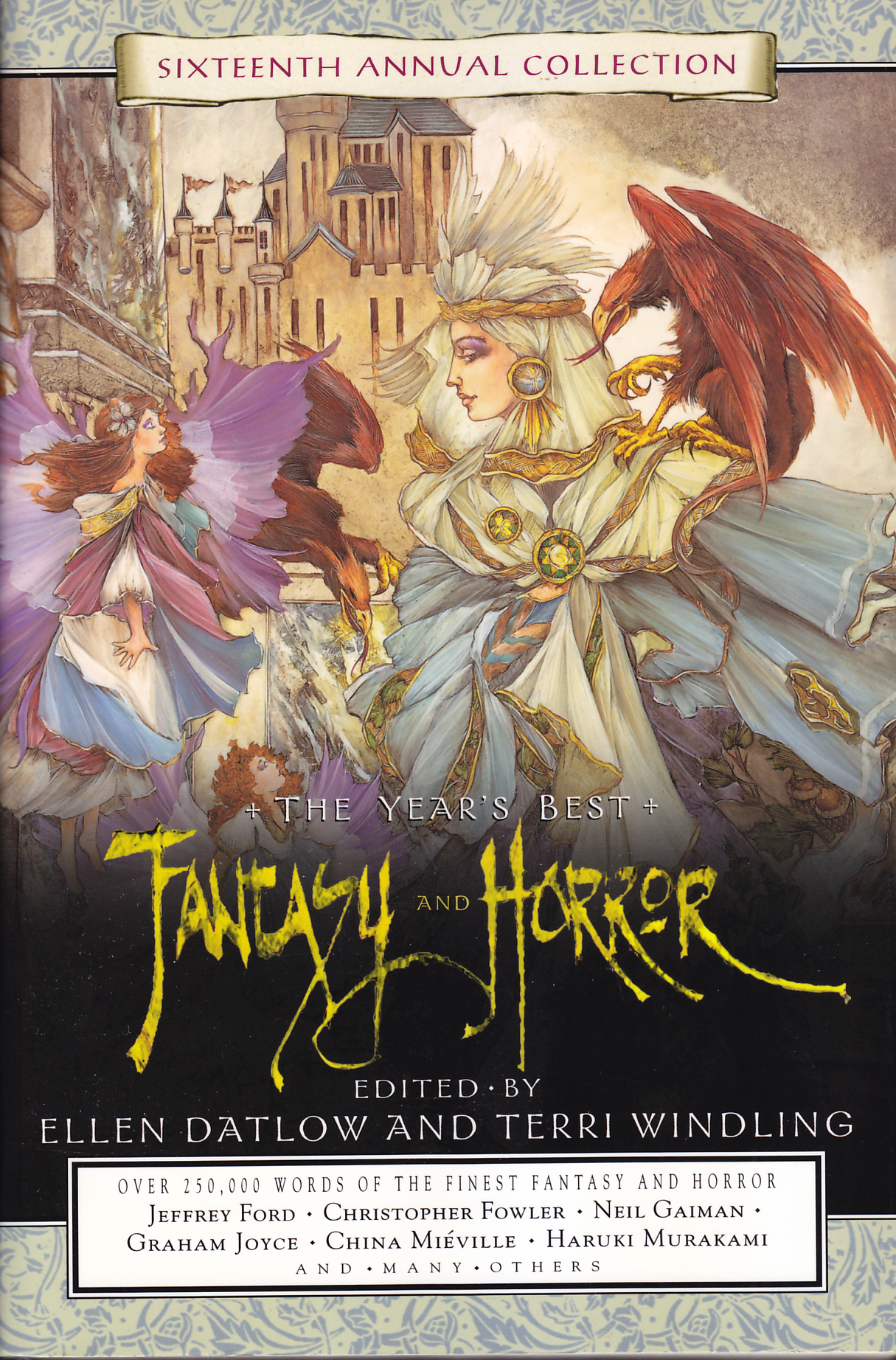Christopher Fowler
Books: Mystery | Fantasy
Bryant & May: Full Dark House (2003), The Water Room (2004), Seventy-Seven Clocks (2005), Ten Second Staircase (2006), White Corridor (2007), Victoria Vanishes (2008), Bryant & May on the Loose (2009), Bryant & May Off the Rails (2010), The Memory of Blood (2012), The Invisible Code (2013), Bryant & May and the Bleeding Heart (2014)
Anthologies
Year's Best Fantasy and Horror: Sixteenth Edition (2003), Naked City (2011)
Bryant & May
Full Dark House (2003)
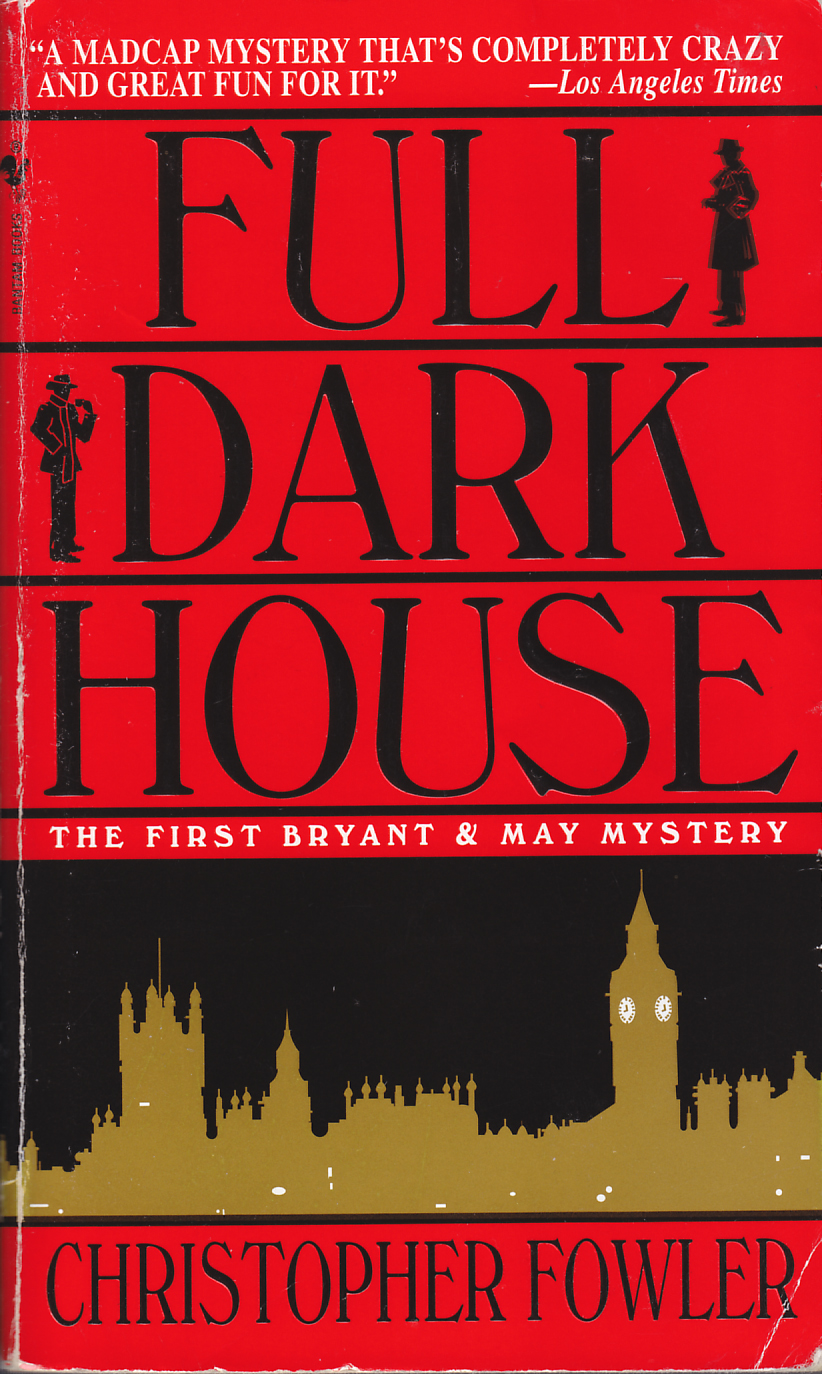 Full Dark House is the first Bryant & May mystery. An explosion destroys the Peculiar Crimes Unit, and Arthur Bryant is believed to have been inside. In order to discover the course and cause of the bombing, John May has to go back 60 years to the first case Bryant & May worked on as partners.
Full Dark House is the first Bryant & May mystery. An explosion destroys the Peculiar Crimes Unit, and Arthur Bryant is believed to have been inside. In order to discover the course and cause of the bombing, John May has to go back 60 years to the first case Bryant & May worked on as partners.
This story is written in two separate time lines: the present timeline as May attempts to discover who bombed their building, and the past time (which takes up the larger portion of the story) as Bryant and May first meet and become partners, and seek a killer who is haunting the Palace theater.
There many different themes (so to speak) in this story. In the current timeline we see May and Bryant struggling with their age, and their ability to continue to work. In the past we learn how they came to be partners, and also see life in wartime London during the blitz.
Having already read the third book, part of the mystery/surprise of Full Dark House wasn't as surprising as it could have been, yet knowing one specific result did not tell me how the result came about, nor did it less my enjoyment of discovering how that result came about. Plus, there were several other mysteries to be discovered.
The interesting thing about this book is that as a mystery I didn't really feel like I was given enough details to figure out whodunit on my own. But it didn't really matter, because getting there was really the important part. The bits about the shortages and the death and the bombs keeping everyone up at night--yet somehow they still manged to live--I mean really live--throughout the whole thing; the meeting of the two detectives and the formation of their strange unit, and their unorthodox methods; the differences between May and Bryant, as May embraced technology and seemed younger than his years, while Bryant was all but allergic to technology, and continually came across as far older than May, despite the very slight difference in their ages.
Bryant is eccentric--what is interesting is his eccentricities seem far greater when he is viewed as a young man than as an older man. Some traits in older gentlemen are excused if not almost expected, while those same traits in a younger man seem far more strange and unusual. And the difference between young man starting out and successful detective with sixty years experience doesn't hurt either.
If you like British mysteries, then I would recommend Full Dark House. I would also recommend starting here, as opposed to starting at a later book. And when I finish the next book, I may just mail these to my grandmother. I think she'll also enjoy them, plus she'll be able to complain about the money I spent on mailing them to her.
Cover by Chris Spollen
Publisher: Bantam Books
August 2006 | Rating: 7/10
The Water Room (2004)
 The second Bryant & May mystery, The Water Room takes place a month or so after the events of Full Dark House–at least the current day events. The Peculiar Crimes Unit is being rebuilt, and during the reconstruction, the unit is at loose ends, and two separate cases fall into the hands of Bryant and May. Benjamin Singh comes to Bryant when he finds his sister dead in her basement. She is sitting in a chair dressed to go out in a chair–and drowned. And an old flame of May's calls him and asks him to check on her husband–she's afraid that he's getting himself into trouble. So to keep the new officers in the unit busy and out of the hands of the main force to keep the unit from being repurposed.
The second Bryant & May mystery, The Water Room takes place a month or so after the events of Full Dark House–at least the current day events. The Peculiar Crimes Unit is being rebuilt, and during the reconstruction, the unit is at loose ends, and two separate cases fall into the hands of Bryant and May. Benjamin Singh comes to Bryant when he finds his sister dead in her basement. She is sitting in a chair dressed to go out in a chair–and drowned. And an old flame of May's calls him and asks him to check on her husband–she's afraid that he's getting himself into trouble. So to keep the new officers in the unit busy and out of the hands of the main force to keep the unit from being repurposed.
Although this is the second book in the series, it's the third book I've read, and so the recurring themes were more noticeable. In every book, the unit is in flux--they're moving or setting up and the offices are in chaos. Bryant is continually insecure about his job. May refuses to act his age.
The thing I noticed this time is that in some ways May is just as eccentric as Bryant. He doesn't acknowledge his age, which isn't so strange, except for the fact that he doesn't like his granddaughter to call him Grandpa. Which them makes the whole thing suspect. There's nothing wrong with keeping young and keeping up with the latest technologies, but the denial of one's age isn't necessarily a healthy thing.
Though even with that he still is nowhere near as eccentric as Bryant.
But what I found most fascinating about this book was the idea of the underground rivers beneath London. I mean, subsuming all those waterways under the city. Are things really as Christopher Fowler describes them? With shunts and gates and emergency waterways? Arches and shunts all decorated even if no one will see them? The whole idea is fascinating. Maybe when I get bored I'll look up more on the underground rivers of London.
I am definitely enjoying this series, and look forward to the next book coming out in paperback.
Cover by Chris Spollen
Publisher: Bantam Books
August 2006 | Rating: 7/10
Seventy-Seven Clocks (2005)
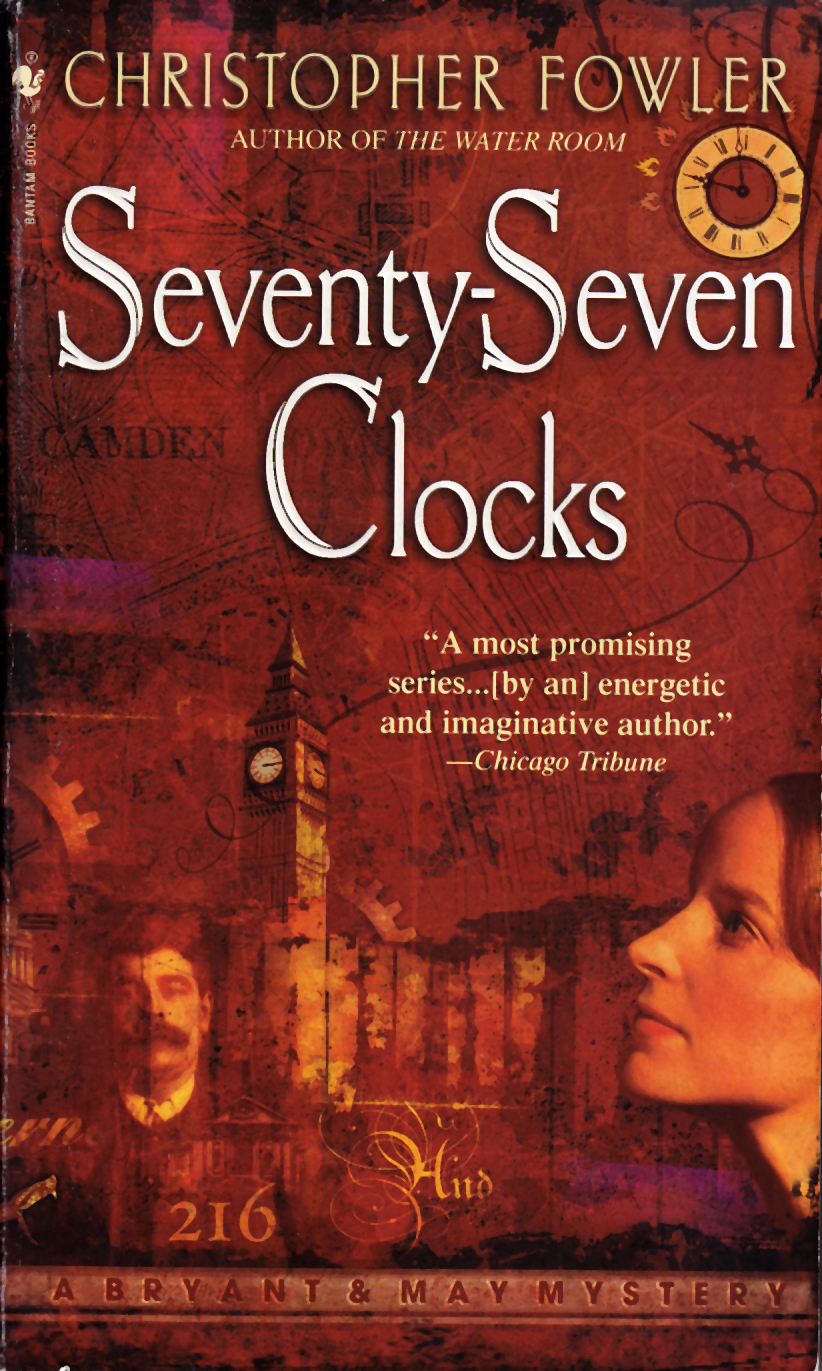 I picked this up at The Bookshelf's Clarence sale. The name intrigued me, and the back cover sounded interesting, although I wasn't quite sure what London's Peculiar Crimes unit was, other than something that sounded fascinating.
I picked this up at The Bookshelf's Clarence sale. The name intrigued me, and the back cover sounded interesting, although I wasn't quite sure what London's Peculiar Crimes unit was, other than something that sounded fascinating.
It's 1973 and the Peculiar Crimes Unit has just been established. Bryant and May have left Bow street to work at a unit that allows them to work in their own ways. One of the first cases is of a lawyer who dies in the lobby of the Savoy. Nothing seems particularly unusual about the case until the autopsy.
This is the third book in the series (I've just ordered the first two), but I didn't particularly feel like I was missing too much history and backstory. (Though I have to admit that Bryant's oddities are more referred to than seen in this story. We're told he has unusual methods and eccentricities, but I didn't see anything too untoward. But then I also read supernatural mysteries, so it could just be me.
The storytelling and the writing are very good, although I have to admit that I was occasionally confused as to what on earth was going on. Because the confusion seemed a part of the story--for the read to feel the confusion that the detectives were feeling as they continued to unravel the case.
The book was also amusing, with lots of enjoyable banter between the two partners. I'm a big fan of banter and witty repartee. Though I do have to admit I'm glad I'm reading this, rather than watching it, because it is far better to read about 70s styles than to actually have to see them.
However, there was one thing that bothered me. The story is set in 1973, and an American character uses the phrase pissed. I don't think he was supposed to mean drunk, since that's British and not at all American, but I thought at that time the phrase more properly should have been "pissed-off" rather than just pissed. It just threw me because initially I thought the character was using pissed for drunk, which was completely wrong, but pissed as in angry didn't seem right to me either. It's not important, but my initial misreading threw me out of the story entirely, and then the more I thought about it, the more it bothered me.
Though I freely admit that I was three in 1973, and not up on all the current slang.
I very much enjoyed Seventy-Seven Clocks, and am looking forward to reading this first two books when they arrive, and definitely plan to loan this book to my grandmother.
Cover by Chris Spollen
Publisher: Bantam Books
August 2006 | Rating: 7/10
Ten Second Staircase (2006)
 Ten Second Staircase is the fourth Bryant and May mystery. A controversial sculptor is found dead in one of her pieces, and the only witness describes an impossible killer. Meanwhile, Raymond Land has complained one too many times about the PCU (Peculiar Crimes Unit) and now the unit is being investigated in hopes of being shut down.
Ten Second Staircase is the fourth Bryant and May mystery. A controversial sculptor is found dead in one of her pieces, and the only witness describes an impossible killer. Meanwhile, Raymond Land has complained one too many times about the PCU (Peculiar Crimes Unit) and now the unit is being investigated in hopes of being shut down.
Although I enjoyed Ten Second Staircase I was somewhat disconcerted because I knew who the killer was almost immediately, and was somewhat frustrated with Bryant and May, because they seemed as if they were being particularly obtuse. Of course they had plenty of other things to distract them, so perhaps that is what kept them from seeing the truth.
Knowing the killer wasn't necessarily a horrible thing, as I often re-read mysteries; it's the story and the characters that are important. The only problem with knowing the killer the first time through was that I kept looking for evidence that I was wrong, so it was a bit distracting.
I also quite clearly remember what it was like to be a teenager--far more clearly I think that others do. Which may have been why I immediately suspected the teenagers. Teenagers can be extremely cruel. The fact that one of the crueler kids in my high school shot and killed someone probably made the murderers even less surprising.
END SPOLIER
However, in addition to finding the Highwayman, Bryant and May have to go back to solve the mystery of the Leicester Square Vampire in order to save the unit from closure. And that mystery I didn't figure out--it seems impossible that Bryant and May could solve a case so old.
One thing that particularly bothered me, and made me re-read a three page section about five times to see if I could get things straight was a bit about a private school.
Most private schools pupils aren't bright because their parents had to pay for their education...Since the dot com gold rush, private schools have been treated like banks--parents put their kids in when they're flush, draw them out again when they're broke.
They talk about private schools as being schools that the parents pay money so the children can attend. Except that I thought that in Britain public schools were the ones that parents had to pay money to send their children to--that public schools in Britain were the same as private schools in the US. So that passage completely confused me, and still doesn't make sense.
As with the previous books, the strong points of Ten Second Staircase were the characters and the storytelling. I really like Bryant and May (well, maybe May a little more) and their relationship. I also like that the secondary characters are developed more with each story--although Longbright continues to confound me. I also liked the continued story with May's granddaughter April. She's had it rough, and it's good that May is finally doing the work he needs to do to make things better with her.
If you've read the previous Bryant and May mysteries, then you will definitely want to read Ten Second Staircase. If you have not read a previous Bryant and May mystery, you should be able to read this story without having the background of the other stories. However, I am always a proponent of reading a mystery series in order, just because I think it's better that way.
Now my only problem is that it's going to be quite a while until the next Bryant and May mystery comes out.
Cover by Chris Spollen
Publisher: Bantam Books
February 2007 | Rating: 7/10
White Corridor (2007)
 Once again the Peculiar Crimes Unit is in danger of being closed. After Raymond Land decided to close the until for a week's vacation, a member of the unit is found killed, while Bryant and May are on their way to one of Bryant's spiritualist conventions.
Once again the Peculiar Crimes Unit is in danger of being closed. After Raymond Land decided to close the until for a week's vacation, a member of the unit is found killed, while Bryant and May are on their way to one of Bryant's spiritualist conventions.
With Bryant and May out of town, the rest of the PCU has to solve the locked room mystery–while another mystery unravels in the middle of a blizzard.
This isn't my favorite book of this series. It's good, and it's funny and made me laugh aloud at several points.
'Mr Bryant is so old that most of his lifetime subscriptions have run out.' Leslie Faraday, the increasingly portly liasion officer at the Home Office, poked about on his biscuit tray looking for a Custard Cream. 'He's only alive because it's illegal to kill him.'
But for some reason I can't put my finger on, it just wasn't quite as good as the previous books. Though it was still well worth reading.
The interesting thing about this mystery is that a big honking clue was actually bothering me, but I simply assumed I'd misread but kept reading anyway, because I was too lazy to go back and check to see if I'd read correctly. That's not quite the same as solving the mystery, but closer than I usually get–precisely because I tend to read too fast and miss details.
If you like British mysteries, then you should check out Christopher Fowler's Bryant and May series. You should be able to start at the White Corridor with no difficulty, but as usually I recommend picking up the first book and moving forward–heaven forbid you miss out on any of Bryant's past irascibility.
Cover by Sarah Coleman
Publisher: Bantam Books
October 2008 | Rating: 7/10
Victoria Vanishes (2008)
 The Peculiar Crimes Unit (PCU) has changed Oswald's retirement party to a wake, and on the way home Bryant sees a woman who is later discovered murdered. Unfortunately for him, he sees her across from a pub that hasn't existed in decades. Unsurprisingly, the PCU is drawn into the case, and discover that several women have been killed in London pubs, and that several of these cases are linked.
The Peculiar Crimes Unit (PCU) has changed Oswald's retirement party to a wake, and on the way home Bryant sees a woman who is later discovered murdered. Unfortunately for him, he sees her across from a pub that hasn't existed in decades. Unsurprisingly, the PCU is drawn into the case, and discover that several women have been killed in London pubs, and that several of these cases are linked.
To make things harder, a new member joins the PCU–a member whose sole goal seems to be to bring the unit down. All in all, this is not a good week for the PCU.
I really like the Peculiar Crimes Unit mysteries. The characters are quirky and amusing, but that doesn't make them any less real. (The PCU seems in many ways like the office from Hell, where all the odd office workers have somehow ended up in a single place.)
But most of all I like the mysteries. In theory, these are police procedurals. Except that they aren't, really, because even the members of the PCU admit they are the regular police and they don't use regular police methods. And the mysteries their office gets aren't the usual murders, but the strange and the bizarre murders that can cause perplexity and even fear.
All in all, I thoroughly enjoyed the story, and highly recommend checking out the PCU mysteries if you haven't already.
NOTE: I really like this story, I just can't place my thoughts together coherently to tell you about it today, so don't let this lackadaisical review keep you from checking out Bryant & May.
Cover by Sarah Coleman
Publisher: Bantam Books
December 2009 | Rating: 8/10
Bryant & May on the Loose (2009)
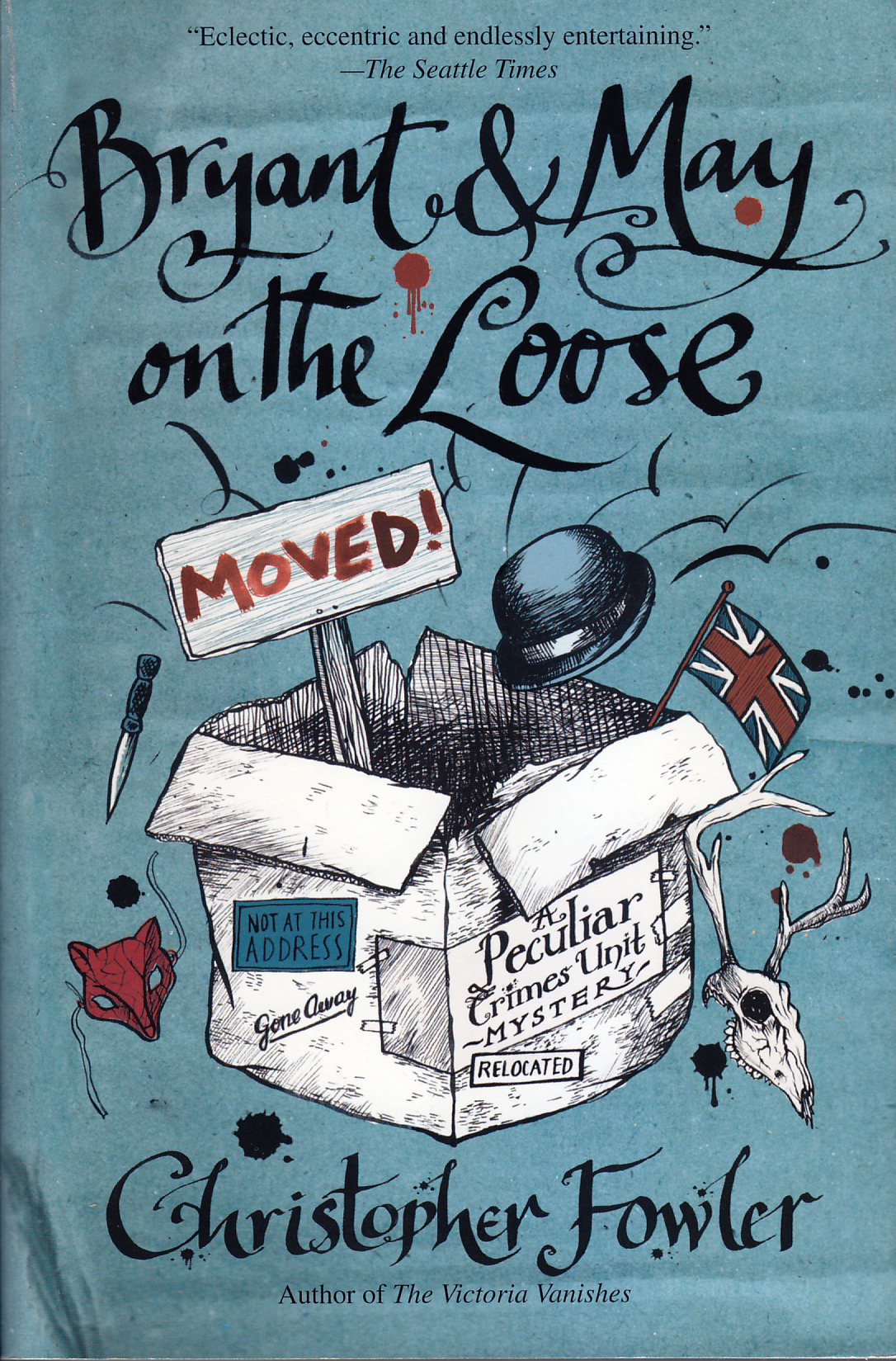 At the close of Victoria Vanishes, the PCU was disbanded, the staff placed on leave, and Bryant remains at home, barely able to get out of bed and slowly slipping away.
At the close of Victoria Vanishes, the PCU was disbanded, the staff placed on leave, and Bryant remains at home, barely able to get out of bed and slowly slipping away.
However, the accidental discovery of a body by a staff member at loose ends brings the group back together, at least for a time, as they attempt to discover a link between the headless bodies and a man haunting the area while dressed as a stag.
The start of the story is almost a perfect treatise on why you need to keep busy when you retire–Bryant is dying by inches, not from any thing, but instead from a lack of reason to get out of bed in the morning.
One of the things I was particularly fascinated by was the history of the horned god as it related to the area, to the green man, and how all of it was subsumed by Christianity–there is a good deal of history in this story, all of which I found fascinating.
It was also interesting–although more than a little depressing–to see how the various members of the PCU reacted to the loss of their jobs. I think I found Janice's reaction the most interesting. Of course I can't say much else along those lines without big giant spoilers. Nevertheless I liked seeing her change.
I am still enjoying this series, and await the publishing of the next book in paperback. (Sorry Christopher Fowler. It's nothing personal, I just dislike hard back books.)
Cover by Sarah Coleman
Publisher: Bantam Books
November 2010 | Rating: 8/10
Bryant & May Off the Rails (2010)
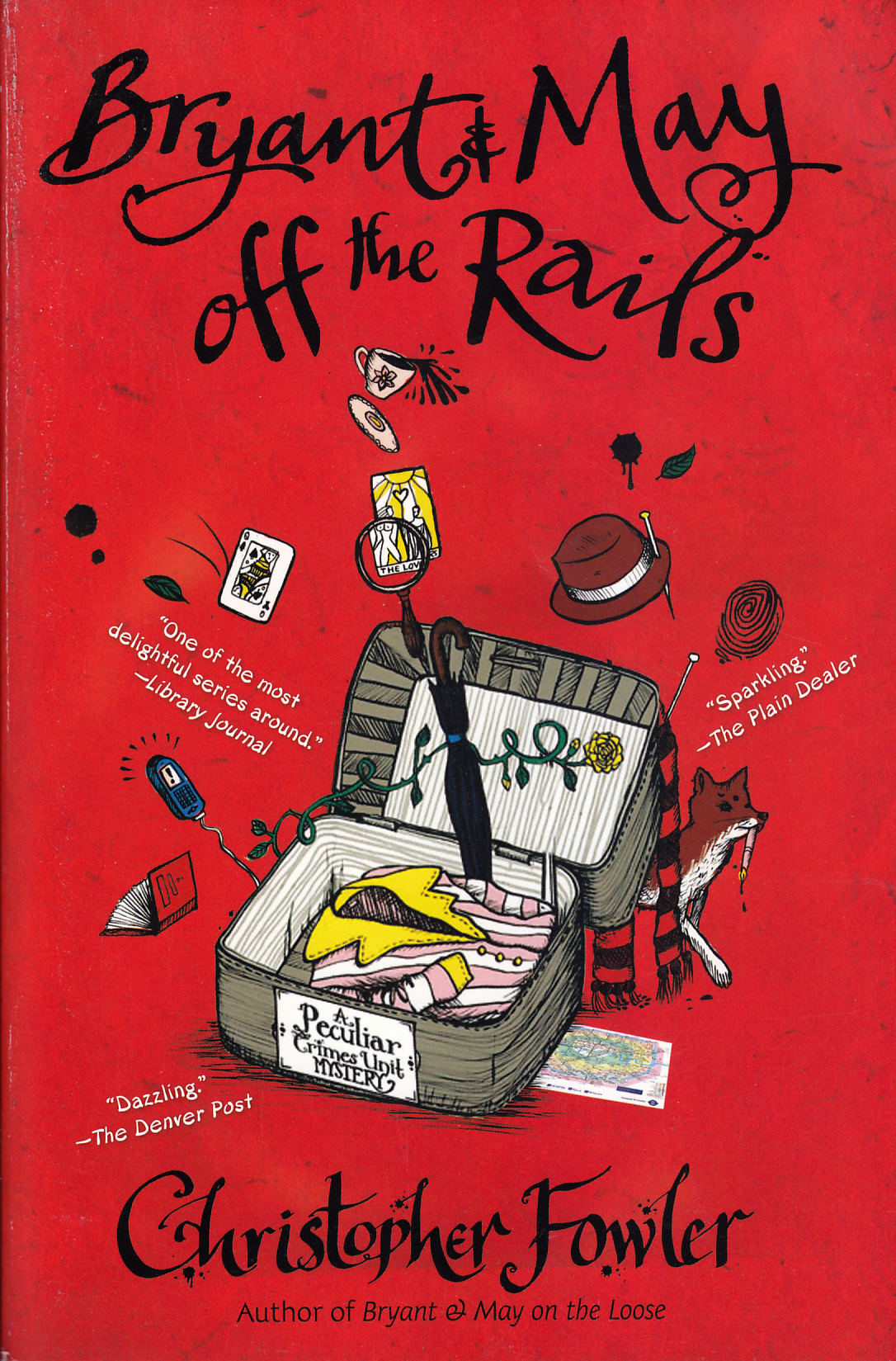 I have to admit, I put off reading this book for several months, and once I picked it up, put it down several times before I could actually get into the story.
I have to admit, I put off reading this book for several months, and once I picked it up, put it down several times before I could actually get into the story.
This has absolutely nothing to do with the story, and everything to do with the fact that Grandmom really enjoyed this series, and I won't be able to share this one with her.
Bryant and May and the rest of the PCU (Pecuilar Crimes Unit) have been reinstated, if perhaps only temporarily, because to keep the unit going, to have to find Mr. Fox–the serial killer who murdered one of their own and then escaped custody.
Mr. Fox's domain is King's Cross station, and a death there–one that seems to have been caused by a push down the stairs–draws them into the station, and the happenings there.
I don't think I can't really talk about my opinion of this book, because mostly I'm thinking about the things Grandmom would and wouldn't have liked.
Cover by Sarah Coleman
Publisher: Bantam Books
February 2012 | NR
Anthologies
Year's Best Fantasy and Horror: Sixteenth Edition (2003) edited by Ellen Datlow & Terri Windling
Published by St. Martin's Griffin
Naked City (2011) edited by Ellen Datlow
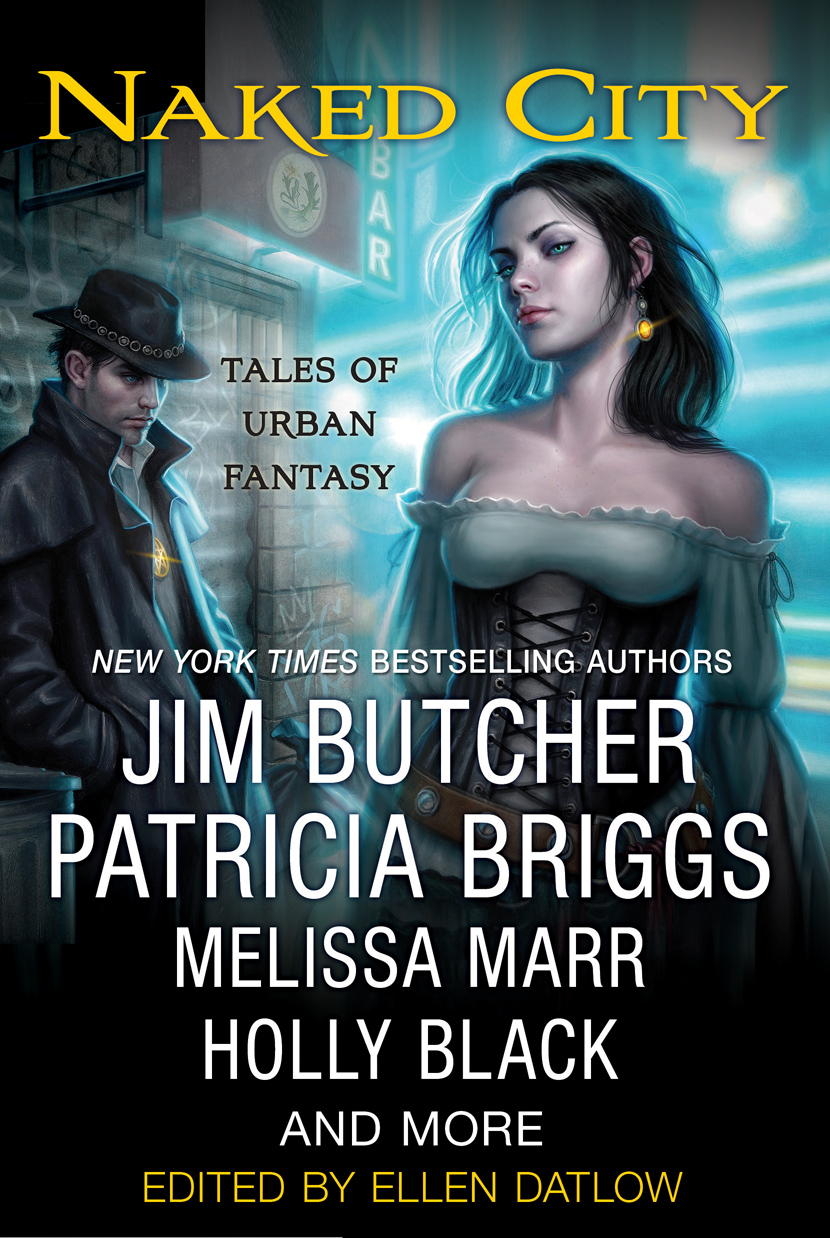 This collection of urban fantasy stories has several of my favorite authors, so it was a no-brainer to get. The bad thing is that I've been reading this collection for several months, so I now have no idea what the stories at the start of the anthology were about, which is dangerous, because it means I may end up accidentally rereading several of them.
This collection of urban fantasy stories has several of my favorite authors, so it was a no-brainer to get. The bad thing is that I've been reading this collection for several months, so I now have no idea what the stories at the start of the anthology were about, which is dangerous, because it means I may end up accidentally rereading several of them.
- Curses by Jim Butcher
- How the Pooka Came to New York City by Delia Sherman
- On the Slide by Richard Bowes
- The Duke of Riverside by Ellen Kushner
- Oblivious by Calvin Klein by Christopher Fowler
- Fairy Gifts by Patricia Briggs
- Picking up the Pieces by Pat Cadigan
- Underbridge by Peter S. Beagle
- Priced to Sell by Naomi Novik
- The Bricks of Gelecek by Matthew Kressel
- Weston Walks by Kit Reed
- The Projected Girl by Lavie Tidhar
- The Way Station by Nathan Ballingrud
- Guns for the Dead by Melissa Marr
- And Go Like This by John Crowley
- Noble Rot by Holly Black
- Dady Longlegs of the Evening by Jeffrey Ford
- The Skinny Girl by Lucis Shepard
- The Colliers' Venus by Caitlan R Kiernan
- King Pole, Gallows Pole, Bottle Tree by Elizabeth Bear
I love Christopher Fowler's Bryant & May mystery series. This is an unrelated stand-alone story about, well… in theory it's about a hold up, but it isn't. Not really.
Although there were several stories I didn't care for, I believe that was more a matter of personal taste than quality. And the stories I did like, I liked very much.
Published by St. Martin's Griffin
Rating: 8/10

